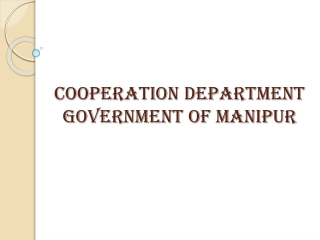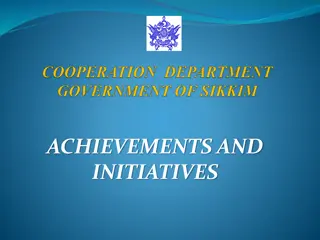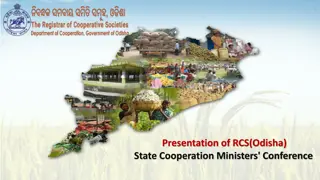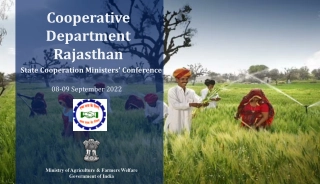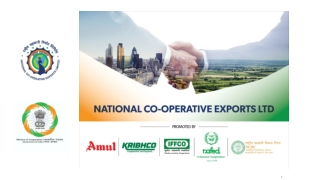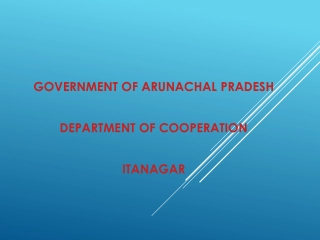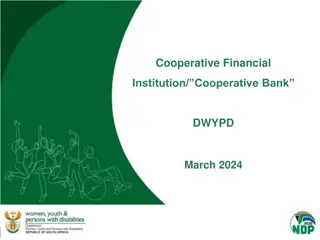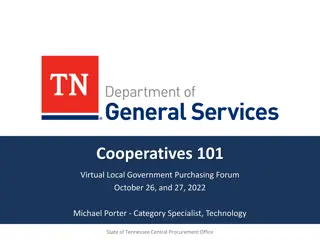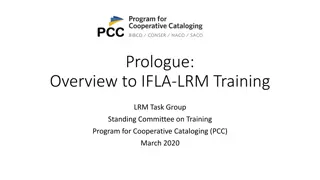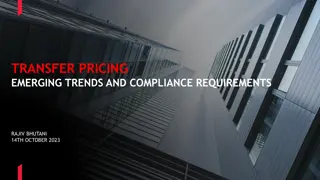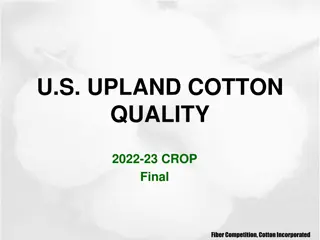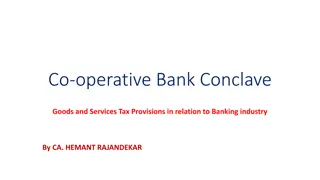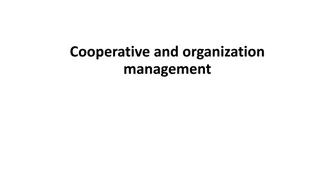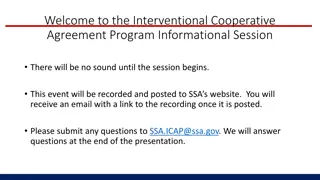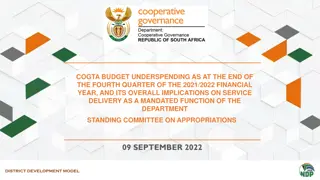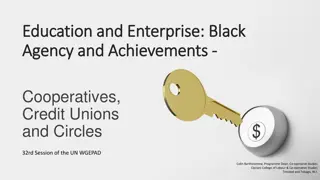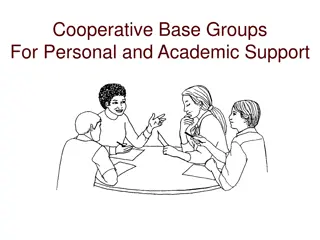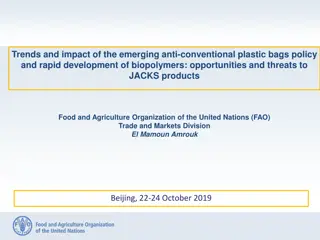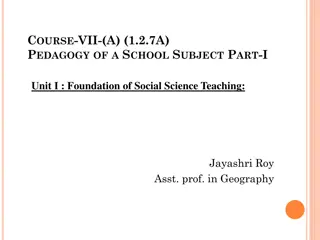Emerging Trends in Cooperative Education: A Comprehensive Overview by Prof. D. Ilangovan, HD
Welcome to the Department of Commerce where Prof. D. Ilangovan shares insights on emerging trends in cooperative education. Education and training are vital for the success of cooperative movements, aiming to educate members and leaders on cooperative principles and practices. The focus is on cooperative member and employee education to improve knowledge and skills. Discover the meaning, importance, aims, objectives, and principles of cooperative education in India, emphasizing self-help, leadership, and organizational efficiency. Explore the organizational structure of cooperative education in India.
Download Presentation

Please find below an Image/Link to download the presentation.
The content on the website is provided AS IS for your information and personal use only. It may not be sold, licensed, or shared on other websites without obtaining consent from the author. Download presentation by click this link. If you encounter any issues during the download, it is possible that the publisher has removed the file from their server.
E N D
Presentation Transcript
DEPARTMENT OF COMMERCE WELCOME PARTICIPANTS BY PROF. D. ILANGOVAN, HD, DEPT OF COMMERCE, AU EMERGING TRENDS IN EMERGING TRENDS IN COOPERATIVE EDUCATION COOPERATIVE EDUCATION
INTRODUCTION Education and training are two basic aspects of co-operative movement. The approach to people must also be educational which can change the concepts, thinking, beliefs and behaviour of people to establish an effective co-operative society. If the cooperative movement is to develop on a sound basis and expand in diverse directions, it is necessary that those who comprise its vast membership are made conversant with the principles and practices of cooperation. It is only that they and their representatives will be able to conduct practice of cooperation. 18-04-2020 Prof.D.Ilangovan, HD Commerce AU 2
MEANING AND IMPORTANCE The term cooperative education pertains to educational I training programmes provided by the cooperative movement for the fulfillment of its own aims and objectives. In India, the terms cooperative education and training are used with a distinct meaning on the basis of focus needed for different groups of clients. Cooperative member education refers to the programmes which seek to improve on the knowledge and understanding of members, prospective members and elected leaders of the cooperatives. Cooperative employee training implies the programmes for the training of paid employees of cooperative organizations and of government concerned with cooperative management and development. Since Indian masses live in rural areas and engage themselves in agricultural and allied occupations, the main focus of cooperative efforts has been on agricultural cooperation. The state, state cooperative unions and the agricultural universities have a decisive role to play in the matter of providing education and training facilities. 18-04-2020 Prof.D.Ilangovan, HD Commerce AU 3
AIMS & OBJECTIVES i. The objectives of cooperative education - To create and sustain faith in the cooperative ideology. -To impress the spirit of self-help and self-reliance among the members. -Creation of right type of leadership, possessing vision, foresight and ability to lead the masses on right path. -Education must make the members feel that they are not only of the cooperative society but also a movement i.e. movement of ideas, new concepts and a new organisation of human relationship. 18-04-2020 Prof.D.Ilangovan, HD Commerce AU ii. The objective of cooperative training -To improve the effectiveness and efficiency of the organization. -To build up necessary knowledge, skills, attitudes among the personnel so that they are competent enough to accomplish the jobs assigned to them. -To motivate the workers to perform their jobs in the interest of the organisation and to attract right type of personnel to the organisation. 4
PRINCIPLES OF COOERATIVE EDUCATION IN INDIA The principles of cooperative education are the same as those of other education, especially of adult education 18-04-2020 Prof.D.Ilangovan, HD Commerce AU A. Acceptance of existing level of understanding B. Learning by doing C. Teaching in the vernacular D. Continuity of education Next, we are going to discuss about the Organisational Structure of Cooperative Education in India .. 5
MAJOR COOPERATIVE INSTITUTIONS International Cooperative Alliance (ICA), Geneva National Cooperative Union of India (NCUI), New Delhi National Council for Cooperative Training (NCCT), New Delhi Vaikunth Mehtha National Institute of Cooperative Education and Training, Pune State Cooperative Unions for each state Natesan Institute of Cooperative Training, Chennai District Cooperative Unions for each district Universities and Colleges offering educational programmes on Cooperation 18-04-2020 Prof.D.Ilangovan, HD Commerce AU 6
18-04-2020 Prof.D.Ilangovan, HD Commerce AU 7
POSITIONOF COOPERATIVE EDUCATIONAND TRAININGIN INDIA In India, the significance of cooperative education and training considerably increased owing to the expansion of the cooperative movement in all directions. Organized efforts for cooperative education were launched as early as in 1914, in Madras. Further developments were made on the recommendations of Mr. M.L. Darling. Consequently, the training was, divided into three stages. In first stage the training was given to train the persons who were to work as teacher and instructors. In the second stage to officers, auditors and clerks and in the third stage to the secretaries and members of the managing committees and agricultural credit societies. Further the cooperative education and training programmes were progressed through different committees. Like the Cooperative Planning Committee (1946), Central Committee for Cooperative Training (1953), All-India Rural Credit Survey Committee (1954), Committee for Cooperative Training (CCT) (1962), in 1976 (CCT) was replaced by National Council for Cooperative Training (NCCT). The NCCT discharged its responsibility of imparting training to senior and middle level cooperative executives through 18 cooperative training colleges allover the country and the National Institute namely the Vaikuntha Mehta National Institute of Cooperative Management (VMNICM), Pune. There is now an attempt to cover members of non-agricultural cooperatives also. There is also a special education programme for women. Some of the state cooperative unions have taken up special programmes for scheduled castes and scheduled tribes. 18-04-2020 Prof.D.Ilangovan, HD Commerce AU 8
EDUCATIONAL PROGRAMMES OFFERED NOW Diploma Programmes 1. Both the Cooperative Unions and Educational Institutions offer a few Diploma as On Campus Programmes viz., Dip. In Cooperation and HDCM 2. On Off Campus Mode we have PGDCM in our DDE Under Graduation in (Both on & Off Campus ones) 1. B.A. (Coop) 2. B.Com. (Coop) and 3. B.Coop. Post Graduation in (Both on & Off Campus ones) 1. M.A. (Coop) 2. M.Com. (Coop. Mgt) and 3. M.Coop Research Programmes as on campus ones. M.Phil.(Coop), Ph.D. (Coop) and Post Doctoral Research in Cooperation 18-04-2020 Prof.D.Ilangovan, HD Commerce AU 9
EMPLOYMENT OPPORTUNITIES IN THE COOPERATIVE SECTOR IN INDIA When you start a society at village level, one can make a Secretary of such a society There are opportunities to join as assistants with necessary experience as trainees or apprentices there Statistical Officers and Accountants in Cooperatives Administrators / Special Officers as Top Managers - CSR Deputy Registrars and Joint Registrars as Taluk level and District level administrators [Group I of TNPSC] Additional Registrars at State level [ on promotion] With an IAS, you can make the Registrar of Cooperatives [RCS] at State level as the sole authority of Cooperative management structure, next to the state Minister Above all you can make a College/University Teacher. 18-04-2020 Prof.D.Ilangovan, HD Commerce AU 10
SUGGESTIONS FOR IMPROVEMENT 1. Primary cooperative societies should be nucleus for local cooperation education and they be made responsible to ensure education of their respective members, leaders, employees and others. 2. A flexible approach regarding contents of cooperative education programme should be adopted prior to organization of classes, survey of the needs of the cooperative society and members, the contents should be based on needs of the members. 3. Leadership development programme should be expanded so as to cover other sectors than agricultural cooperatives. 4. Effective collaboration with agricultural extension agencies and other development agencies/functionaries like gram sevaks/sevikas should be established by cooperative education agencies. 5. State governments may be approached to provide adequate financial support to the unions for expanding cooperative education programme. 18-04-2020 Prof.D.Ilangovan, HD Commerce AU 11
NCUI RECOMMENDATIONSON COOPERATIVE EDUCATION A. Institutional integration B. Functional integration C. Preparing action plan D. Linking training with promotions E. Standardization of cadres F. Catch them young G. Refresher Courses for Working Staff and Officers H. Periodical Staff Training and Development Programmes 18-04-2020 Prof.D.Ilangovan, HD Commerce AU 12
NCUI LEADS COOP. TRAINING INSTITUTIONS With more than 150 million primary members, the NCUl claims to represent the largest cooperative movement in the world. Out of these, more than 1.6 million members are annually covered under its various educational programmes. Organizational set up for Cooperative Education Programme (CEP) is a three tier structure with NCUl at the national level, 27 state cooperative unions and 323 district cooperation unions in some states. To assess the implementation of the programme, the NCUI convenes annually a national conference of cooperative education and administration. For cooperative education and training, it has built up a large infrastructure. The structure consist of is cooperative college, a National Institute and 92 junior cooperative training centres. These are categorised into three cooperative levels. A. Senior level The training of senior or higher personnel s, both departmental as well as institutional, is conducted on an all India basis at Vaikunth Mehta National Institute of Cooperative Management at Pone. The Institute undertakes research and field study programmes, offers management consultancy services and organizes cooperative seminars, etc. It also awards diploma in cooperative business management and also conducts various other specialized courses. B. Intermediate level For intermediate level personnel s, training .programmes are arranged at the 17 cooperative training colleges. These training colleges conduct higher diploma courses in cooperation of the duration of 36 weeks. Diploma courses are also organized for industrial cooperatives, cooperative marketing, land development, banking, etc. C. Junior level The training for junior cooperative personnels is conducted by the state government and for this purpose 89 training centres have been opened in different parts of the country. Some of these centres also organise special orientation courses. 18-04-2020 Prof.D.Ilangovan, HD Commerce AU 13
COOPERATIVE EDUCATION FOR WOMEN In view of the importance of cooperative education for women it is necessary to strengthen the programme. The measures for strengthening the programme are as follows. A. Intensification of the programme The programme should be intensified and extended to all the states of the country. Steps should be initiated to bring all the districts in each scale under the purview of the scheme in a phased manner. B. Creating women's wing A separate women's wing should be created under each state cooperative union. The wing should be headed by a lady cooperative education officer who will be responsible not only for supervision of the programme but also for the organization of various promotionals and developmental activities for involving women of the state in the cooperative movement. C. Multiplying number of instructors The number of lady cooperative education instructors under this programme should be increased. There should be at least one such instructor in each district for the intensification of educational activities among women. D. Formation of women's advisory committees Each state cooperative union should constitute a women's advisory committee. The main function of the committee would be to assess the: implementation of the programme from time to time and to provide necessary guidance to the women's wing. E. Conducting study and research The state cooperative unions should conduct study and research on women participation in the various sectors of the state level movement. Such documents should be published for wider circulation. 18-04-2020 Prof.D.Ilangovan, HD Commerce AU 14
DRIVE FOR MEMBER EDUCATION A. Selection of the group leader and the secretary B. Training of group leaders and secretaries C. The problems of illiteracy D. Frequency of group meetings 18-04-2020 Prof.D.Ilangovan, HD Commerce AU 15
18-04-2020 Prof.D.Ilangovan, HD Commerce AU 16



